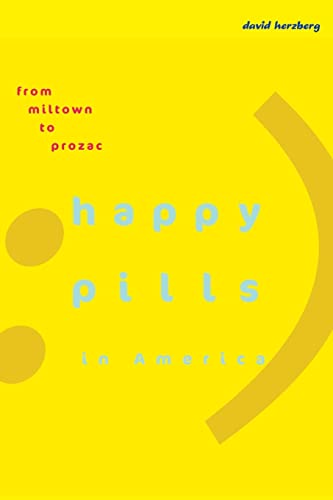Happy Pills in America
From Miltown to Prozac
David Herzberg
BOOK REVIEW

In the haunting echoes of modern America, Happy Pills in America: From Miltown to Prozac draws an intricate map through the pharmaceutical revolution that has quietly ensnared the nation in an embrace of sedatives and stimulants. Authored by the insightful David Herzberg, this work is not merely an exploration of antidepressants but a razor-sharp critique of how America has navigated the choppy waters of mental health over the decades. With each page, you are pulled deeper into the labyrinth of societal expectations, medical interventions, and the often-overlooked implications of our hurried quest for happiness.
As Herzberg uncovers the trajectory from Miltown-a drug that charged the 1950s with a promise of serenity-to the ubiquitous presence of Prozac in contemporary medicine cabinets, he cultivates an unsettling yet compelling narrative. You may find yourself reflecting on how America transitioned from viewing anxiety and unhappiness through a moral lens to treating them as mere chemical imbalances that can be rectified with a pill. This ideological shift has had profound implications, complicating our understanding of mental health, wellness, and the very nature of happiness itself.
What stands out in Herzberg's work is not just the historical timeline but the vivid characterizations of the people-patients, doctors, and pharmaceutical executives-whose lives are interwoven into this tapestry of medicated existence. Each story feels personal, as relatable as the struggles we all encounter in a society that values performance over peace. Readers have commented on the book's ability to evoke deep-seated emotions and provoke critical conversations about the ethics involved in our reliance on pharmaceuticals. Critics argue that Herzberg's portrayal invites us to question whether we are truly addressing the roots of our unhappiness or merely patching over the symptoms with band-aids crafted in corporate laboratories.
💊 The cultural commentary embedded in this work is striking-it challenges the very foundation of what we perceive as normal. What are the costs of our quick fixes? Each chapter begs the question: at what point does our dependence on these 'happy pills' blur the lines between treatment and modification? By drawing connections to broader historical movements, Herzberg highlights how societal pressures have shaped the pharmaceutical landscape, from the post-war desire for tranquility to the modern obsession with productivity.
Perhaps the most poignant aspect of Happy Pills in America is its evocation of empathy. As the narrative unfolds, you find yourself resonating deeply with the tales of despair and hope-an unsettling mirror reflecting parts of your own experience. Readers have expressed gratitude for Herzberg's ability to break down complex medical jargon into relatable terms, making the discussion accessible yet impactful. This is not just a book for scholars or those entrenched in the medical field; it is a call to arms for everyone navigating a world where happiness seems like an elusive ideal.
In recent reviews, some voices have raised concerns that Herzberg's critique could be seen as dismissive of legitimate medical needs. Yet, I argue this perspective misses the broader point he masterfully articulates. The book does not denounce medication but rather interrogates the context within which it is prescribed and consumed. There is a delicate balance here between acknowledging the efficacy of pharmacological interventions and recognizing the sociocultural dynamics that influence their usage.
📖 The tapestry of Happy Pills in America is not a straightforward one. Herzberg's narrative is a potent reminder that mental health is not simply a matter of pills-it is a complex interplay of biology, society, and individual experience. He compels us to confront our perceptions of wellness and the societal structures that shape our relationships with mental health. As this critically acclaimed work resonates with readers seeking to understand their experiences and those of others around them, it stirs a collective awareness that there is more at stake than simple prescriptions.
As you traverse the pages of this audacious exploration, you might just find the courage to question the status quo of mental health treatment in America. The game has changed, but are we ready to face the implications? If the pharmaceutical revolution teaches us anything, it is that the quest for happiness, once perhaps an innately human endeavor, has been transformed into a complex web of commerce, culture, and contradiction. Happy Pills in America is not just a must-read; it is an intellectual and emotional awakening that will undoubtedly leave you pondering long after the last page is turned. 🌟
📖 Happy Pills in America: From Miltown to Prozac
✍ by David Herzberg
🧾 296 pages
2010
#happy #pills #america #from #miltown #prozac #david #herzberg #DavidHerzberg